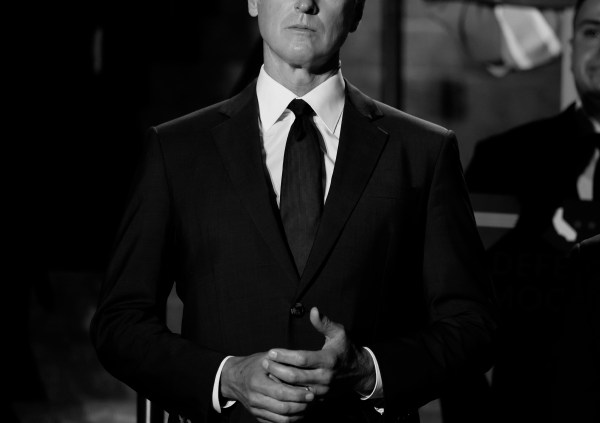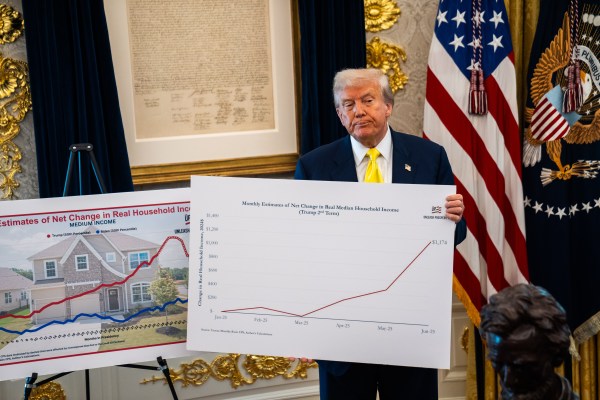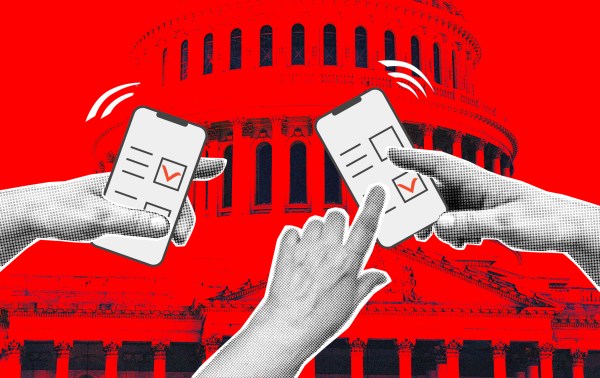The economy is (finally) growing and President Biden is claiming credit. But how much credit (or blame) does any president deserve for the business cycle?
It turns out that the economy’s jobs performance during a given presidency is determined more by the state of the economy inherited on Inauguration Day than on any subsequent presidential policy. Presidents who inherit recessions typically end up with strong job growth, while presidents who inherit booming economies typically end up with sluggish job growth and even recessions. This pattern—paired with the fact that voters have consistently elected and reelected Republicans during booms, and then swapped in Democrats during recessions—explains the misperception that Democratic presidents are better than Republicans at managing the economy.
Let’s unpack this by taking those points in reverse. We often hear that 10 of the past 11 recessions began during Republican presidencies, and that more jobs are created during Democratic administrations. Case closed: Democrats manage the economy better, right?
Wrong. We’re all taught never to confuse correlation with causation, especially with small data sets such as recent presidencies. For example, more than 97 percent of America’s war deaths over the past 150 years have come from four wars (World War I, World War II, the Korean War, and the Vietnam War) that either took place or saw America’s role heavily escalated with Democrats in the White House. Does that reflect a systematic failure of Democratic foreign policy, or suggest that the party cannot be trusted on international affairs today? Hardly. Presidents respond to the unique challenges of their time and cannot control outside events.
Similarly, presidents inherit not a blank slate economy but a spot on the business cycle. Economic expansions eventually overheat, slow down, or hit an exogenous shock that brings a recession. These recessions typically self-correct back into an economic expansion after six to 18 months. The business cycle occurs naturally and is largely independent of political actions (although the Federal Reserve can heavily influence the business cycle, more so than stimulus legislation that is often implemented after the recession has already ended).
This brings a paradoxical conclusion: While each presidency and each business cycle is different, history suggests that we should expect presidents who enter office during (or shortly following) a recession to oversee more jobs and economic growth than those who enter office well into a stable, mature economic boom.
The jobs numbers bear this out. Since 1977, there have been 11 four-year presidential terms. Six of those terms began in a weak economy (with an unemployment rate between 7.3 and 8 percent), while five began in a strong economy (with an unemployment rate between 4.2 and 5.4 percent). Sure enough, the “weak inherited economy” terms saw an average of 7.7 million new jobs created, while the “strong inherited economy” terms created an average of just 2.8 million new jobs.
This makes intuitive sense: Presidents inheriting a weak economy typically ride the natural recovery upward with millions of unemployed workers eager to return to work. On the flip side, strong economies that have basically run out of unemployed people to move into jobs are more likely to begin decelerating and shedding jobs at some point.
How does this affect the narrative of Democratic booms and Republican recessions? Since voters have elected Republicans during booms and Democrats during busts, it’s all but guaranteed that Republicans will be in the White House whenever a boom eventually exhausts itself, and a Democratic president will then ride the natural business cycle back up.
Ronald Reagan took office in 1981, and Republicans held the White House until the 1991 recession brought in Democrat Bill Clinton, who oversaw the recovery and was reelected in 1996. Then, during a growing economy, the next open seat went to Republican George W. Bush, who stayed until the 2008 recession brought in Democrat Barack Obama, who also rode a recovery to reelection in 2012. Then once again, voters in 2016 elected a Republican in an open race, before replacing Donald Trump with Democrat Joe Biden during the 2020 pandemic recession.
In short, the last three Democratic presidents entered office during or just after recessions, while Republicans took office during booms. This means the popular causation is reversed: Presidential parties do not determine the business cycle. Rather, the business cycle largely determines the presidential party.
Critics respond that these Republican presidents broke the economy, and Democrats fixed it. This requires proving that Republican presidents—by themselves—somehow directly caused the 1991 recession, 2008 housing crash, and 2020 global pandemic (as well as recessions that started while Reagan and George W. Bush were just beginning their presidencies), and also that Democratic presidents directly ended the 1991, 2008, and 2020 recessions with little to no help from the business cycle, Federal Reserve, or Congress. Economists generally disagree with those claims.
The current cycle of electing Republican presidents during booms and Democratic presidents during recessions began in the 1980s. However, the earlier five “Republican recessions” that began between 1953 and 1976 were also driven by external factors rather than immediate presidential policies. The GOP held the presidency for two-thirds of this period, and thus happened to be in office during contractionary Federal Reserve periods, OPEC oil embargoes in response to the Arab-Israeli conflicts, and economic overheating that gradually spilled over from LBJ’s guns-and-butter buildup. These “Republican recessions” were also bookended by “Democratic recessions” in 1949 and 1980 under Presidents Truman and Carter. In these cases, trying to identify a specific recession-driving policy from the current president is a fool’s errand (however, longstanding policies inherited from predecessors can contribute to recessions).
The better way to measure presidential jobs records is by adjusting for the economy they inherited. This analysis reveals three outliers over the past few decades. First, President Clinton’s second term overachieved by adding 9.5 million jobs to an economy that was already near full employment. Second, President Obama’s first term underachieved by inheriting a recession and creating only 1 million jobs, compared to the 6 million to 10 million jobs typically created during terms that begin with high unemployment. And third, President Trump’s term overachieved by adding 6.6 million jobs (or nearly double the CBO-projected level) to an already booming economy before a global pandemic destroyed that progress. Of course, even these outlier performances are influenced by a multitude of factors, many outside White House control.
Which brings us to President Biden. Because he inherited an economy that was reopening from a government-required shutdown, the Congressional Budget Office forecast that 8.4 million jobs would be added during the current presidential term even under the do-nothing baseline. At this point, the 11.5 million net added jobs are beating that projection, albeit with some help from an unsustainable government spending spree driving an inflationary expansion. The question is whether the hangover from this inflation—and especially the Federal Reserve interest rate hikes it has necessitated—can avoid a jobs reversal in the next year (as Presidents Trump and George W. Bush learned, a lot can go wrong economically in the final year of a presidential term). Either way, the performance standard should be measured beginning at the 8.4 million baseline jobs that were projected when Biden took office. No extra credit for the economy reopening as planned.
Presidential elections are often just a referendum on a business cycle that proceeds with little actual presidential influence. But that won’t stop presidents from taking credit for any good news.
Brian Riedl is a senior fellow at the Manhattan Institute. A longer version of this article appears in the spring 2022 issue of National Affairs.






Please note that we at The Dispatch hold ourselves, our work, and our commenters to a higher standard than other places on the internet. We welcome comments that foster genuine debate or discussion—including comments critical of us or our work—but responses that include ad hominem attacks on fellow Dispatch members or are intended to stoke fear and anger may be moderated.
With your membership, you only have the ability to comment on The Morning Dispatch articles. Consider upgrading to join the conversation everywhere.